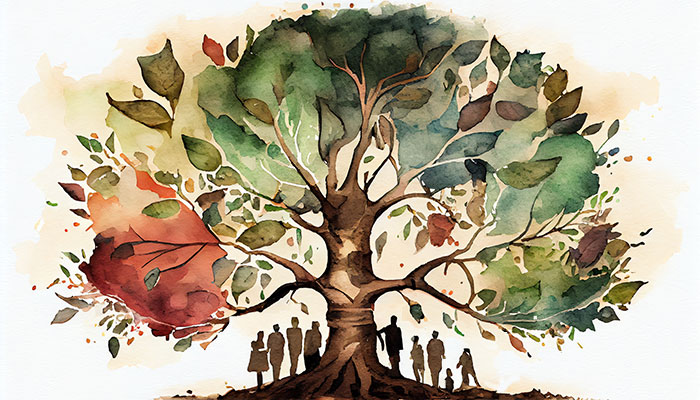Elder Care Rochester
Our monthly newsletter
September/October 2023
Stepfamilies come in all shapes and sizes. When a stepparent needs help, the burden will likely fall on your mom or dad. They may have their own health challenges. Start connecting with your stepsiblings before a problem arises so you can coordinate to support the best health for both of your elders. For our middle article, we look at senior move managers. These professionals can ease the stress of downsizing and moving to a new residence. Their services also smooth the transition as your loved one adjusts to new circumstances. Last, we look at frontotemporal dementia (FTD). Approximately 10 percent of dementia conditions fall into this extremely challenging category.
Caring as a stepfamily
The majority of us feel obliged to help an ailing parent (77 percent, according to Pew Research Center). But if your parent is okay and your stepparent is ill, then what? Should you help with caregiving? (Pew data indicate 56 percent of us feel obliged.) What if your parent also has health challenges and providing care is too much? What about your stepsiblings?
These are good questions best answered in advance.
Here are some ways to generate teamwork no matter who is involved.
- What are the elders’ thoughts about care? Talk with your parent first, but eventually with your stepparent also. Ask: When the time comes that more help is needed, what are their plans? Stay at home and hire helpers? Get help from the kids? (Any thoughts about who might do what?) Move to assisted living or memory care (together or apart)? Move in with family? (Whose?)
- Create connections. Perhaps you grew up together. Or it may be that you’ve never met your stepsiblings. (This is not unusual with a late-life marriage. But you don’t want your first meeting to be in the ER!) At the least, identify one or two of your stepparent’s children you think might be receptive and trade emails and phone numbers. Frame it as a way to keep each other apprised in case problems are observed with either parent. Consider “liking” them on Facebook and making supportive comments now and then. That’s an easy way to start building a friendly rapport that will be invaluable in a crisis.
- Offer to get a conversation started with all the siblings. Perhaps hold a meeting of the “family” with all its members. This way both parents can share their thinking so far. If even a virtual meeting is impractical, you might encourage the parents to write a joint letter to all the siblings so everyone gets the same information at once.
- If the parents aren’t sure what they want. Ask what you might do to help. Perhaps you can facilitate a meeting of just the siblings—no parents—to see who is available to do what should the time come that help is needed.
- Set aside family politics. Every family has baggage. Perhaps you already have some strong feelings about your stepsiblings. When dealing with aging parents, it’s necessary to leave issues with each other at the door and focus simply on helping the elders in need. If this proves unmanageable, consider hiring a professional such as an Aging Life Care™ Manager or a counselor who is trained to facilitate family meetings.
Senior move managers
Does your loved one need to downsize? Move? Does the prospect seem overwhelming? Perhaps not just physically, but emotionally too? Enter the senior move manager: Part mover, part interior decorator, part compassionate friend. These professionals take a holistic approach. They handle the physical logistics. They are also skilled at assisting older adults with the emotional side of a move.
Senior move managers provide services from A to Z. You can buy a full package or hire them for tasks à la carte.
- Outlining a plan for the move
- Developing a comprehensive floor plan of the new place
- Reviewing and sorting possessions
- Selling/disbursing items that won’t be moved
- Interviewing, scheduling, overseeing movers
- Packing or supervising the mover’s packers
- Arranging shipments and storage
- Unpacking and setting up the new dwelling
Fortunately, move managers can help an older adult come up with creative solutions for shedding possessions while preserving the memories. (“How about we save three of your favorite trophies and put them on special display? We can photograph the others to rotate through on your screen saver.”) They know how to work with persons who have dementia. Some also understand hoarding.
Senior move managers can yield money savings too. They know where to get best prices for antiques, books, and other collectables. They often have relationships with allied professionals such as realtors or contractors who may even offer a discount for their services. And don’t forget that a senior move manager can spare you from taking time off work for packing and unpacking. Or that extra plane flight to get things organized.
If this all sounds good, look for a move manager who is a member of the National Association of Senior & Specialty Move Managers. Members have training and insurance and abide by a professional code of ethics.
Return to topFrontotemporal dementia (FTD)
Frontotemporal dementia (FTD) is an umbrella term for a cluster of conditions that makes up about 10 percent of dementia cases. It’s the most common form when dementia occurs before age 65.
What sets FTD apart is a sudden and dramatic change. Often in a person’s behavior. But speech and/or movement abilities can be affected. Memory loss comes later. As a caregiver, you want to focus on managing symptoms. And on finding FTD specialists to make life easier for everyone.
Take note of these key strategies
- Behavioral symptoms. Apathy, resistance, or even combative responses. People with FTD often undergo a dramatic shift in personality. For example, social inhibitions may disappear. As a result, they may say or do rude things. Don’t take what they do personally. It’s the disease! Observe which situations or times of day tend to set your loved one off. Then work with an occupational therapist. They can help you create a daily routine that avoids triggers and reroutes the behavior.
- Speech problems. Your loved one may not be able to find words. Or understand the spoken word. This is frustrating for everyone! Work with a speech therapist. They can show you communication techniques that match your loved one’s abilities.
- Movement problems. From tremors to muscle weakness, your relative may be at high risk for falls. Work with a physical therapist who specializes in FTD. They can help your loved one stay safely mobile for as long as possible.
Get support for yourself. Especially if your loved one is your spouse and you are under 65. There are many midlife passages you may have to navigate by yourself—for both of you. Talk with a therapist who understands FTD. And find a support group by contacting the Association for Frontotemporal Degeneration: info@theaftd.org or 866-507-7222.
Return to top



